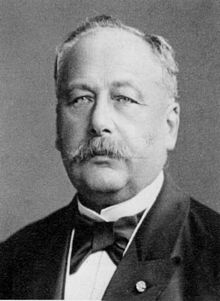Friedrich Flügge
Friedrich Ferdinand Gottlieb Georg Flügge (born May 2, 1817 in Lübenheen , † December 4, 1898 in Rostock ) was a German civil servant. He was the grand ducal Mecklenburg post office director in Rostock and earned services to improve the traffic conditions in Mecklenburg .
biography
Friedrich Flügge was the son of Anton Friedrich Christian Flügge, the post writer in Lübheen, later in Redefin , and Henriette Maria Elisabeth, née Behren. Ludwig Karl Flügge was his younger brother.
After an initial training as a private mail clerk with his father, Flügges began working life in 1836 at the Oberpostamt in Schwerin . In 1844 he worked as a postal secretary in the Post Central administration. After the reorganization of the higher regional authorities and the formation of the General Postal Directorate Schwerin in October 1849, which was subordinate to the Grand Ducal Ministry of Finance, Flügge was appointed postal inspector there. In his function, Flügge was a representative in negotiations with the Prussian State Printing House, which led to the introduction of postage stamps and postal stationery in Mecklenburg. A noteworthy idea by Flügge led to the printing of the 1/4 Schilling stamp, which made it possible to realize all the values that resulted from the conversion of silver groschen into schilling with one stamp. 480 stamps were printed on one sheet, cut according to the value. Only the three values 4/4 shillings, 3 shillings and 5 shillings were required.
In 1856 Flügge was promoted to senior post inspector and in 1860 to senior post office director. In 1860 he became head of the Oberpostamt for the Rostock area and this function required the family to move - Flügge was with Elise, nee. Steinhoff married - to Rostock.
Flügge was very active professionally and socially in Rostock. In 1871 he made the proposal to found a steam shipping company for the beginning ferry traffic to Denmark. Rostock-Nykjöbing Dampfschiffahrts-Aktien-Gesellschaft was founded in January 1872, and Flügge became its chairman. He held this position until the company was dissolved in 1886. Regular ferry services between Rostock and the Danish Nykøbing Falster began in 1873.
Flügge also played a major role in the construction of the new post office. This building, built in 1881 in the historicizing neo-Gothic style, was located in Wallstrasse am Rosengarten. A rail connection from Warnemünde to Neustrelitz with the connection to Berlin was also started on Flügge's initiative. The line was opened on July 1, 1886. When the Warnemünde – Gedser trajectory went into operation in 1886 , a new harbor basin had to be built. Flügge participated in the planning and decision. He was a member of the committee of the Berlin-Hamburger-Eisenbahn Aktiengesellschaft .
Works
several writings on the Mecklenburg postal history:
- The Mecklenburg-Hamburg Postcourse , 1866
- The Mecklenburg Post Office in Hamburg until June 1st , 1814 , 1866
- Rostock Post Chronicle , 1881
- From the chronicle of Rostock-Nykjöbing Dampfschiffahrts-Aktien-Gesellschaft 1871-1886 , 1886
Honors
- His achievements for the city were honored in 1893 with the honor of being an honorary citizen of Rostock .
- Since 1998 a street in Rostock has been called Friedrich-Flügge-Straße .
| personal data | |
|---|---|
| SURNAME | Flügge, Friedrich |
| ALTERNATIVE NAMES | Flügge, Friedrich Ferdinand Gottlieb Georg |
| BRIEF DESCRIPTION | Grand Ducal Mecklenburg Post Office Director |
| DATE OF BIRTH | May 2, 1817 |
| PLACE OF BIRTH | Lübheen |
| DATE OF DEATH | 4th December 1898 |
| Place of death | Rostock |
